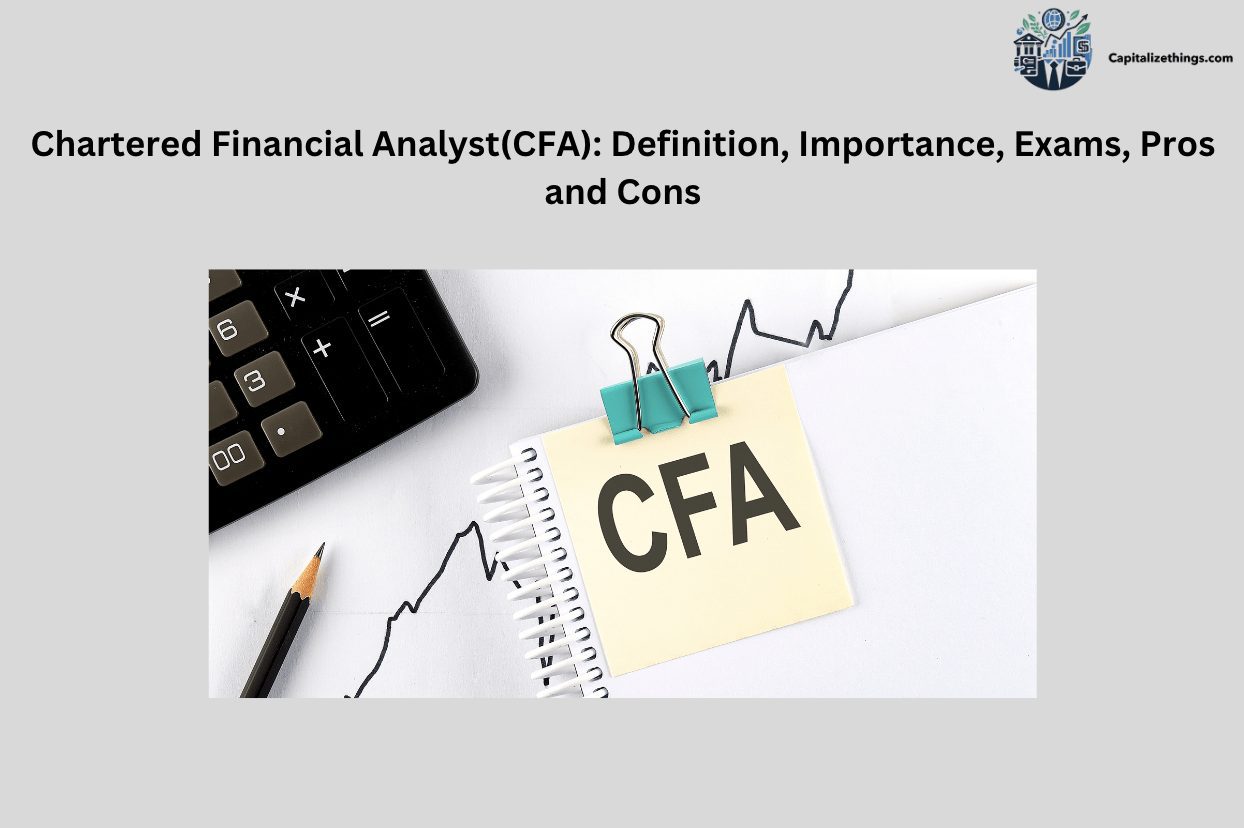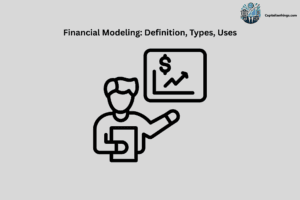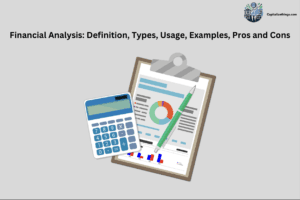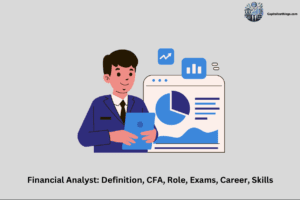The CFA Institute, which evaluates and certifies financial analysts, offers the worldwide recognized chartered financial analyst (CFA) charter. Students must pass three levels of tests in economics, accounting, money management, ethics, and security analysis. From 1963 to November 2023, almost 3.7 million CFA candidates took the exam—the total pass rate was 45%. Over 2014–2023, the 10-year pass rate averaged 43%.
Finance professionals consider CFA charters the gold standard in investment analysis. To qualify as charter holders, candidates must pass three challenging tests, have a bachelor’s degree, and have 4,000 hours of relevant work experience over three years. Passing the CFA Program examinations takes dedication and substantial study. The CFA has over 200,000 charter holders in 164 countries. With 11 offices worldwide and 160 local member societies, the CFA Institute awards the designation. AIMR became the CFA Institute.
Pros: First, it will teach you a lot and boost your CV. Then your reputation improves. Businesspeople understand the time and effort required to get the charter. They will likely feel you have the competence, ethical grounding, hard work, and analytical skills to accomplish the job if you have earned it. There can be financial gains. Being a CFA could increase your pay or give you an edge over other applicants for a new job.
Drawbacks: Career recovery with the CFA takes time. If that’s why you’re enrolled, carefully examine the CFA training ahead. Consider improving your soft skills, such as work ethic and collaboration.
What is a Chartered Financial Analyst CFA?
A CFA is a globally recognized certification for investment management professionals. The CFA Institute certifies investment analysts and wealth managers as chartered financial analysts. Consider CFAs the money management industry’s all-stars: individuals excel in economic analysis and have worked hard to attain the gold standard. CFA Institute-certified financial analysts are CFAs. Financial analysts decide how to spend money to maximize earnings, whether through stock investments or M&A.
The CFA Institute boasts over 200,000 CFAs in 160 sectors, and finance professionals and their employers value this charter.
This certification proves the holder knows economics, financial analysis, investment management, and investing ethics. The charter also teaches quantitative, economic, and analytical abilities. Depending on their finance career, a CFA’s daily routine will vary. Other professions can be client-focused, while research analysts analyze data to inform investment decisions. A study by Rodriguez, 2023 found that firms managing assets exceeding $500 million were more likely to employ CFAs than CFPs.
Wondering how a CFA can boost your financial career? Let our specialists at capitalizethings.com offer you personalized advice. Get in touch or call +1 (323)-456-9123 before using the number to schedule a free 15-minute session with our financial experts.
What are the basics of Chartered Financial Analyst (CFA)?
CFAs specialize in high-level investment management through in-depth knowledge of economics, corporate finance, and equities. Large firms employ CFAs to investigate and analyze investment companies. A CFP usually suffices for average people who require financial planning and investing guidance. Unless they have an enormous amount of financial wealth to manage, Rodriguez says, suggesting a CFA.
Are there 2 types of CFA?
Yes, there are 2 main types of CFA: Chartered Financial Analyst and Confirmed Factor Analysis.
- Chartered Financial Analyst (CFA) is a professional designation awarded by the CFA Institute. It is globally recognized and focuses on investment management, financial analysis, and ethical standards in finance. Individuals pursuing the CFA designation must pass three levels of exams and meet professional work experience requirements.
- Confirmed Factor Analysis (CFA) is a statistical method used in social sciences, psychology, and marketing research to test how well measured variables represent the number of underlying factors or constructs. This approach helps to verify hypothesized relationships between variables, ensuring data structure validity.
Both forms of CFA are valuable, but they serve distinct purposes: one in finance and investment, and the other in statistical data validation and model building.
What are the 3 levels of CFA?
The three levels of the CFA exam assess increasing levels of investment management skills as Level I focuses on basic knowledge, Level II covers the application of that knowledge, and Level III tests portfolio management and essay writing skills. Each level must be passed in sequence to become a CFA charterholder. Exams are offered in February, May, August, and November.
Passing all levels typically requires more than 900 hours of study across three levels, with CFA Institute (2024) reporting pass rates at 37%, 47%, and 49% for Levels I, II, and III respectively.
What is level 1 CFA?
Level 1 of the CFA exam tests fundamental knowledge in eleven key areas of finance. The subject areas and exam percentages are:
- Economics 6-9%
- Quantitative Methods 6-9%
- Corporate Issuers 6-9%
- Equity Investments 11-14%
- Financial Statement Analysis 11-14%
- Fixed Income 11-14%
- Portfolio Management 8-12%
- Alternative Investments 7-10%
- Derivatives 5-8%
- Ethical and Professional Standards 15-20%
Level I has the lowest pass percentage of the three tests, at 41% over the past decade (compared to 45% and 52% for Levels 2 and 3). The CFA Level I test includes 180 multiple-choice questions. Many require you to finish a sentence correctly, and others ask you to pick the best of three solutions to a question.
What is level 2 CFA?
The 22 vignette-based exam sets and 88 multiple-choice inquiries on the CFA Level II exam cover ten content areas. The content areas and exam percentages are:
- Quantitative Methods 5-10%
- Financial Reporting and Analysis 10-15%
- Economics 5-10%
- Corporate Issuers 5-10%
- Equity Valuation 10-15%
- Portfolio Management 10-15%
- Derivatives 5-10%
- Fixed Income 10-15%
- Alternative Investments 5-10%
- Ethical and Professional Standards 10-15%
What is level 3 CFA?
Level III, the CFA final, demands test takers to understand all curriculum areas and design and manage portfolios. This exam has two parts: 6 item sets & 5 essays or 5 item sets plus 6 essays. The content regions and percentages are:
- Economics 5-10%
- Derivatives 5-10%
- Portfolio Management 35-40%
- Fixed Income 15-20%
- Alternative Investments 5-10%
- Equity Investments 10-15%
- Ethical and Professional Standards 10-15%
What does a CFA do?
A Chartered Financial Analyst (CFA) is a professional who specializes in investment management and financial analysis. CFAs are experts in areas such as portfolio management, equity research, fixed-income analysis, and financial modeling. They often work with investment firms, hedge funds, banks, and insurance companies to analyze financial markets, guide investment decisions, and provide strategic financial advice.
Earning the CFA charter involves passing a series of rigorous exams, covering topics like economics, corporate finance, quantitative methods, and ethics, which positions CFAs as highly credible professionals in the global financial industry.
Should you hire a chartered financial analyst for your investments?
No! It is optional to hire a chartered financial analyst for your investments. Yes, it will offer you a rough knowledge of how the investing process works and some language fluency, which is vital. If you only want to invest in stocks, you can skip ethics (it only applies to investors who invest for others), fixed income, derivatives, and possibly portfolio management.
The “no” is that the program presumes competence in economics, accounting, and finance. Much investing theory is academic and unlikely to be useful. Again, accounting requires knowledge and can be presented poorly. A basic undergraduate financial accounting textbook could prove more useful and understandable.
Next is the big part—application. After reading this, you might learn something, but most of it wasn’t taught in the CFA curriculum. Like studying anything else, just 10% is valid, but you never know which 10%. For instance, studying accounting won’t help you respond; why are specific problems with accounting relevant to an investor in this specific business at this particular time? These questions can only be answered by doing practice.
Our Chartered Financial Analysts are ready to optimize your investment strategy. Reach out by calling +1 (323)-456-9123 to schedule a free 15-minute consultation and discuss how our experts at capitalizethings.com can help you.
What is a senior CFA salary?
A senior CFA (Chartered Financial Analyst) can expect a salary ranging from $120,000 to $200,000 annually, depending on factors such as location, experience, and the specific financial institution they work for.
Here is an average salary table for a senior CFA based on location and experience level:
| Location | Average Salary (USD) | Experience (Years) |
|---|---|---|
| New York, USA | $150,000 – $200,000 | 10+ |
| London, UK | $140,000 – $190,000 | 10+ |
| Hong Kong | $130,000 – $180,000 | 10+ |
| Toronto, Canada | $120,000 – $170,000 | 10+ |
| Singapore | $125,000 – $175,000 | 10+ |
| Zurich, Switzerland | $150,000 – $210,000 | 10+ |
| Sydney, Australia | $130,000 – $180,000 | 10+ |
| Dubai, UAE | $140,000 – $200,000 | 10+ |
This table provides a general range of average salaries for senior CFAs, but actual salaries can vary depending on the firm, industry sector, and additional compensation like bonuses and equity options.
How much do chartered financial analysts make as beginners in the USA?
As of Sep 12, 2024, the average US No Experience CFA salary is $91,602.
What is the quantitative method in CFA?
Quantitative methods in CFA Level 1 cover statistical and mathematical concepts applied in finance. Original CFA Institute textbooks are self-explanatory for Quants if you understand 10+2 math. For clarity, read Investopedia and watch free YouTube videos. Lots of question practice is vital. Do this from the syllabus, CFA institute website, and Schweser question bank. You do not require reading much on the concepts for the exam if you comprehend the curriculum.
How valuable is a CFA designation?
The CFA is highly valuable and recognized as a global standard for investment management professionals. The CFA Institute says this certificate is the professional standard of distinction for more than 31,000 investment firms worldwide. A CFA certificate can be helpful if you want to work in finance but don’t have a bachelor’s degree in finance, accounting, or economics.
Unlike the MBA, the CFA Institute is the sole entity that awards the CFA, which can vary in substance, rigor, and reputation. This nonprofit association deals with asset management and research. The CFA Institute develops, administers, and evaluates a curriculum that stays relevant in a complicated environment. The Institute and exam’s international reputation matters more.
CFAs’ knowledge and skills allow them to work both nationally and globally. They engage in insurance, business and investment banking, and asset and private wealth management. A 2019 CFA Institute compensation research study based on 15,000 members found that they self-reported $177,000 with a $126,000 base wage. The study also indicated that CFA average base wages climbed faster than that year’s broader market.
What are the top chartered financial analyst institutes in the US?
There is only one top chartered financial analyst institute in the US, the CFA Institute. The CFA Institute is the main US and global CFA organization. Its rigorous program includes portfolio management, investment analysis, and ethics, making it a respected finance degree.
What are the certification requirements to become a chartered financial analyst?
To become a CFA, candidates must meet education and experience requirements, pass three exam levels, and provide professional references. The time investment is also significant. Only half pass Level I or II of the three-part CFA test after studying over 300 hours for each component.
It takes several processes to become a CPA. Educational requirements, the three-part CFA exam, and job experience are needed to become a CFA. Before joining the CFA program, you must meet school requirements, but you can work while studying. Within 36 months, you must have 4,000 hours of experience.
To become a CFA Institute member, complete educational, testing, and experience requirements and apply. Membership applications require 2-3 professional references. Your references must describe your career and character.
Requirements
Many professional certificates require a degree, but not the CFA. The CFA Institute offers three flexible course options. To join the CFA program and take tests, you must meet one of the following:
- Bachelor’s degree
- Within 23 months of bachelor’s degree.
- Have 4,000 professional and/or higher education hours from 36 months.
- No matter your degree, you must have professional job experience and pass all three CFA exam levels to become a CFA.
CFA candidates must have 4,000 hours of investment and finance experience. The experience can involve paid internships, part-time employment, and remote work. Teamwork, problem-solving, critical thinking, and investment analysis of decisions should be part of your working experience. Work experience required for the CFA examinations can be gained before, during, and after the tests.
How difficult is it to pass CFA exams?
CFA exams are notoriously difficult, with pass rates for all levels hovering between 35% and 52%. Passing rates for CFA exams have been declining since 1963. Historically, Level I and II passing rates range from 37% to 52%, with Level III slightly higher. When the examinations were launched, pass rates were far higher, showing that the curriculum became more rigorous and competitive.
The passing rate has changed in recent years. CFA Level I exam pass rates are around 35%–44%. These rates are excellent for determining its difficulty: Many applicants resign after failing this first test. Based on the exam session, the average CFA Level II passing percentage is 44% to 52%. Recently, the CFA Level III test, the final step to the CFA charter, has seen passing percentages between 45% and 56%. These rates were slightly higher than Levels I and II, demonstrating the program’s difficulty.
Say you took Level I in 2022 among the 37% who passed that year. You enroll in Level II the next year and 47% pass. In February 2024, Level III is taken, with 49% passing. Fortunately, the CFA permits six attempts at each level. Only two attempts (six months apart) are allowed per year.
What skills are needed to become a successful CFA?
CFA Charterholders need solid accounting, finance, and economic skills. Data analysis, communication, problem-solving, and ethics are also essential.
The following skills are essential to become a successful CFA:
- Discipline: Consistent commitment to long-term, intense study despite personal sacrifices.
- Time Management: Effectively balancing CFA preparation with work and personal life.
- Integrity: Maintaining high ethical standards and honesty in financial analysis.
- Diligence: Thorough, consistent study and preparation without seeking shortcuts.
- Focus: Maintaining concentration on studies despite distractions and challenges.
1. Discipline
Many pursue CFA charter without understanding discipline. At a minimum, you commit to 22 months of intense effort. Sometimes, this involves declining social invitations you’d prefer to accept. It can require temporarily giving up lifelong pastimes. To pass the CFA test, discipline requires making many little decisions to stay on task.
2. Time management
Time management is essential for CFA exam preparation. Life continues after 300 hours of study at each level. Working, family, and other obligations make it hard to study for exams. Once behind, it’s hard to catch up. Maintain a realistic study plan and try to follow it.
3. Integrity
Financial analysis at the CFA charter level involves ethics and honesty. Excellent CFA charterholders establish checks and balances to counteract biases. Experienced CFA charterholders are hired for their clear and thorough analysis. They must act with integrity in everything they do.
4. Diligence
CFA exams cannot be crammed. Many have had to learn the hard way. Exam prep providers are the only obvious shortcut. You must study key concepts and test your knowledge. It’s the only way to ensure you have the foundational knowledge to solve CFA test difficulties.
Preparing for Level I requires not settling for good enough. Each CFA level builds on the previous one’s expertise. Being adequate to pass Level I could leave you in a problematic situation for Level II due to your inadequate foundation.
5. Focus
Focus is difficult in a world full of distractions. According to one survey responder, you’ll have bad work days. You’ll hate spending two or three more hours at the library. But you will. To get the CFA charter, you must focus on your studies and the top prize you’ll receive. You can only get there by moving.
What are the benefits of hiring a chartered financial analyst?
The benefits of hiring a chartered financial analyst:
- Progress in career: Enhanced advancement and role diversification in finance.
- Opportunities to network: Global professional connections through CFA Institute.
- Work opportunities: Improved job prospects due to recognized expertise.
- Obligations lifted: Exemptions from certain requirements and qualifications.
- Advanced know-how: Superior financial expertise across various topics.
- Potential earnings growth: Increased salary potential in current or future roles.
1. Progress in career
A CFA charter can improve your chances of promotion. To try something new, a CFA can work in many roles, including corporate financial analyst, CFO, risks manager, asset manager, financial consultant, and stockbroker.
2. Opportunities to network
Charter members of the CFA Institute can network with members worldwide. A CFA charter can help you uncover new employment options, improve financial understanding, and build business partnerships. It can help you work at international companies and outside the US.
3. Work opportunities
The CFA charter can improve your financial credentials and job prospects. Industry employers understand the discipline and time needed to become a CFA charter holder. Employers can see your analytical skills and work ethic with the designation.
4. Obligations lifted
CFAs can waive licensing requirements in various countries. Getting a CFA can enable you avoid the GMAT for graduate school. Your CFA can waive ongoing education and work experience criteria for other certifications.
5. Advanced know-how
CFAs demonstrate superior financial expertise. CFA test topics include quantitative methods, portfolio management, economics, ethics, financial reporting, and analysis. Studying the relevant subjects might improve your understanding of finance and help you pass the tests.
6. Potential earnings growth
Earning a CFA charter can increase your earnings. This might happen with current or future jobs. A CFA can increase your salary in the same position or get you a raise.
What are the disadvantages of hiring a chartered financial analyst?
The CFA charter does not guarantee fame and money. Consider the potential drawbacks before earning one.
- CFA Course Length: Extensive time commitment impacting personal life.
- Registration & Enrolment Costs: Significant financial investment for fees and materials.
- CFA Certification Limitations: Not a guaranteed solution for career problems.
1. CFA Course Length
To become a CFA, you must study for and take the tests and work 4,000 hours over 36 months.8, you’ll stop enjoying your hobbies and family time. Despite your efforts, you can still need to get the charter.
2. Registration & Enrolment Costs
Though minor, this is worth considering. Level I candidates must pay a one-time program enrolment and exam registration fee. Additional registration fees apply to Level II and III candidates. Another consideration is the cost of study guides and books. Always budget a couple of thousand dollars for exams.
3. CFA Certification Does Not Fix Career
The CFA cannot save a failing profession. If you’re participating in the program to jumpstart a stagnant job, consider other reasons first.
How much does hiring a CFA cost?
Hiring a CFA costs between $1,500 and $2,500. CFA exam taking candidates pay lots costs. As an American company, the CFA Institute charges in dollars. The one-time program enrollment price is $450; each level costs $1,000 to register. Registering nine months before the exam saves $300. Late registration costs $1,450. The initial tuition gives pupils access to the online program, but tangible materials cost extra. This cost varies by location.
What should you look for before hiring a CFA?
Employers value the following skills, which the CFA program identifies. Students must complete three tests to get CFA charters. All three tests cover various course subjects; however, the CFA Institute lists the significant points:
- Professional and Ethical Standards
- Economics
- Quantitative Methods
- Financial Statement Analysis
- Corporate Issuers
- Fixed Income
- Equity Investments
- Derivatives
- Wealth Planning and Portfolio Management
- Alternative Investments
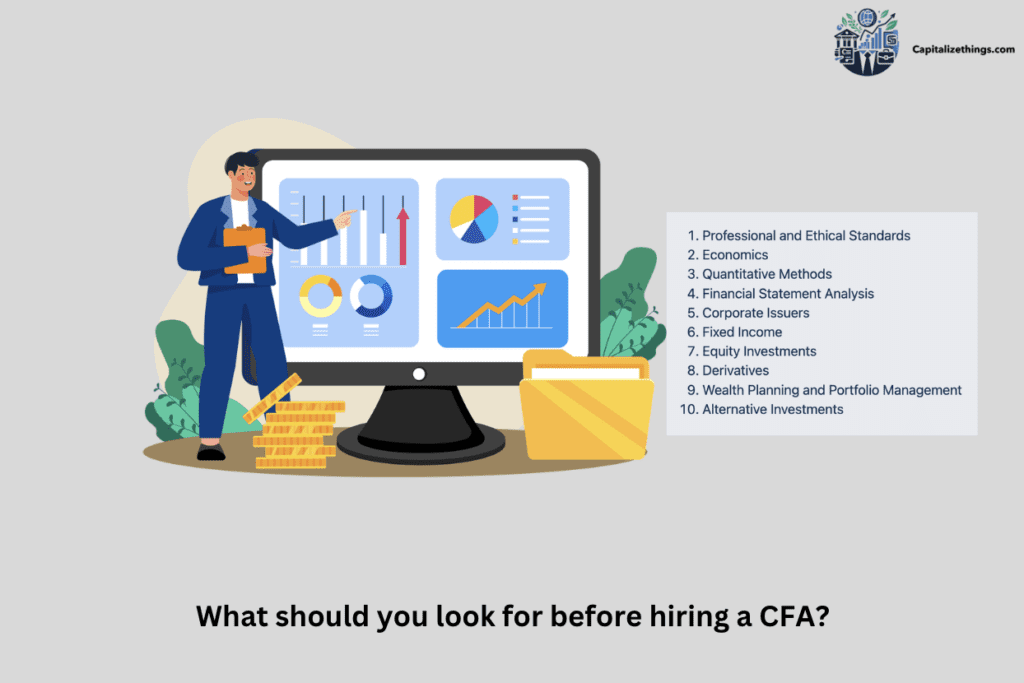
What does a CFA program teach?
The CFA® Program provides organizations with core knowledge and advanced investment analysis and portfolio administration abilities.
Is CFA worth it for financial advisors?
No! It does not cover all financial services. The CFA is the best investment designation; however, it does not cover all financial planning topics. The CFA designation can benefit corporate executives more than financial planners.
Candidates’ investment knowledge increases with the CFA designation. Earning the CFA credential can boost a financial advisor’s value in a financial institution or bank, leading to career development. Suppose an employed financial advisor has the time to earn the designation, which takes 300 hours of study per level and four years. In that case, there are few negatives—candidates’ personal investment knowledge soars, meaning better, more effective solutions for their companies.
A more critical investigation is needed if the financial advisor is an independent contractor growing a profession outside an organization. Advisors will learn more, but it costs a lot of time. That time could be better spent prospecting for clients, expanding the firm, and improving operations. Remember that the CFA designation is only for investors. Successful financial counselors excel beyond investments. Their specialties include insurance, investments, tax, risk management, estate, retirement, and compensation planning.
How often does a chartered financial analyst need to be renewed?
Renew annually to enjoy member benefits, show your commitment to responsible investment management, and promote the industry.
What is a CFA job?
CFA stands for Chartered Financial Analyst. CFAs advise and manage portfolios for individuals, companies, and other organizations. They can work in banks, investment firms, insurance, and academia. Certification as an investing professional is required. The CFA designation indicates superior investment analytical expertise and ethics.
What is a CFA salary?
The average CFA salary in 2025 is approximately $90,000 annually.
How much do chartered financial analysts make as beginners in the USA?
The compensation of chartered financial analysts is high, but it depends on location and experience. However, these are US CFA salary estimates.
- Entry-level financial analysts make between $80,000–$90,000 annually.
- Mid-career professionals earn between $90,000–$100,000 annually.
- Senior experts earn above $120,000 annually.
A 2024 study by the Financial Analysts Journal, authored by Dr. John Williams, notes that CFAs are increasingly in demand in regions like New York and California, where starting salaries are about 10–15% higher than the national average. The CFA designation can lead to careers in investment banking, portfolio management, and even academia, depending on one’s career aspirations.
Does CFA make a lot of money?
Yes! CFA charterholders make a significant amount of money. In 2019, the CFA Institute conducted a compensation study, concluding that portfolio managers earned an average base salary of $126,000, with total compensation reaching up to $177,000 including bonuses and other incentives.
The salary for CFA holders can vary depending on the region and the level of experience, but typically, the CFA designation is a pathway to lucrative roles in finance, especially in portfolio management, investment analysis, and corporate finance roles. According to Payscale, CFA charterholders typically earn around $102,000 per year, with portfolio managers being among the highest earners. The CFA designation not only provides strong earning potential but also allows professionals to pursue global career opportunities.
Is CFA actually worth it?
Yes! The CFA charter can enhance your career but it is not a guaranteed key to success. You are ultimately responsible for your achievements, and the CFA charter is a powerful tool to help you get there.
Over time, we’ve found that CFA charter holders who got new finance jobs or were promoted within their companies used enthusiasm, perseverance, determination, and other CFA attributes to succeed. They worked hard after clearing CFA exams. They needed to set high standards for their job hunt or desire a better position. Instead, they researched the jobs wherein a CFA charter is more appreciated and made a long-term plan to work hard and advance to management. A student could use the CFA Program to find an internship or entry-level job to build experience toward CFA charter holder status.
Financial professionals have succeeded by applying for roles or promotions that benefit from the charter. Portfolio managers make up 22% of CFA charterholders, according to CFA Institute.
What is the difference between CFA and CFP in terms of skills?
The main difference between a CFA and a CFP is that CFA certification focuses more on investment analysis and portfolio management, while CFP certification is centered around financial planning and working with individual clients.
CFA charterholders typically work with data and large-scale investment portfolios, making them suitable for positions in investment management and financial analysis. On the other hand, CFP professionals are often focused on managing client relationships and guiding them in personal finance matters, such as retirement planning, tax strategies, and savings plans. The CFA is a globally recognized qualification for investment professionals, while the CFP is more aligned with personal financial advising and planning.
According to the CFA Institute, CFA holders are most commonly employed in portfolio management and investment analysis roles, whereas CFPs tend to focus on client advisory services in areas like tax planning and retirement.
Can CFA become a quantitative analyst?
Yes! CFA can become a quantitative analyst. Good financial foundation in investment evaluation, portfolio administration, and ethics for CFA candidates. Quantitative finance success requires your skills. It would help if you had statistics, math, and programming skills to become a quant. You must train and code yourself, preferably using a free platform and code to customize and accelerate learning.
Is CFA quantitative or qualitative?
CFA is both quantitative and qualitative. The CFA program combines quantitative financial analysis and qualitative risk assessments to support informed decision-making in public and private sectors.
CFA charterholders are trained in quantitative techniques like financial modeling, security analysis, and portfolio management, but they are also skilled in qualitative evaluations, such as assessing the ethical and risk-related aspects of financial decisions. Each assessment considers various uncertainties and factors that could impact financial outcomes, making it a comprehensive approach.
What is the difference between a Chartered Financial Analyst and a financial analyst?
The key difference is that Chartered Financial Analysts (CFAs) have a globally recognized certification that focuses on investment management, while financial analysts may not have the same credential and often perform more general financial tasks.
CFAs specialize in areas like portfolio management, securities research, and investment analysis, whereas financial analysts may work on broader tasks, such as preparing financial reports, analyzing business performance, or providing insights on budgeting. Financial analysts can work without formal certification, but the CFA designation adds credibility and specialization in finance, particularly for handling large-scale investments and corporate strategies.
How do you study financial statement analysis for CFA?
To study financial statement analysis for CFA, you should cover all relevant readings, master basic concepts, and practice applying financial ratios. Financial statement analysis is a core topic in the CFA Level I curriculum, and success requires a combination of theory and practical knowledge. Key steps include understanding income statements, balance sheets, and cash flow statements, as well as honing skills in financial ratio analysis. Mock tests and sample questions are vital for preparation, helping you apply your knowledge in an exam setting.
Enhance your financial statement analysis for CFA exams with our specialized team at capitalizethings.com. Reach out first through our email form on services page before calling +1 (323)-456-9123, and we’ll offer a free 15-minute consultation to help you navigate the toughest CFA topics.
Do Chartered Financial Analysts provide security analysis services?
Yes! Chartered Financial Analysts (CFAs) offer security analysis services, which involve evaluating and valuing stocks, bonds, derivatives, and alternative assets. The CFA program extensively covers security analysis, and the designation requires this skill, allowing CFAs to do extensive security research and investment evaluations.
Do you need a CFA to be an equity analyst?
Yes! The CFA Institute’s Chartered Financial Analyst (CFA) designation is the top professional qualification for equities research analysts and others in securities research. Candidates must have 4,000 hours of experience for this designation, which is usually a prerequisite for higher-level roles. Three exams are needed for the designation.
Many stock research analysts need a license from FINRA, a national securities regulator. Most analysts fulfill license requirements after hiring since they need sponsorship from their employer.
Do alternative investment strategies fall under Chartered Financial Analyst training?
Yes! Alternative investment strategies are covered under Chartered Financial Analyst training. The advanced investment analysis program also teaches business analysis, probability theory, statistics, fixed income, derivatives, economics, corporate finance, financial analysis, different kinds of investments, portfolio management, and general finance.
The CFA charter and CFA charterholder are issued to candidates who finish the program and meet additional professional standards. At least 190,000 persons are charter-holders worldwide as of November 2022, up 6% annually since 2012 (including the epidemic). Successful CFA charter applicants take four years on average.
Is CFA a better alternative to other financial certifications?
No! CFA is not superior to other financial certifications. The FRM or CFA certification you choose can affect your future. Nationally and internationally, CFA and FRM certifications are acknowledged. FRM emphasizes organizational risk management, while CFA emphasizes investment management. All credentials serve distinct job goals, but none is better. Choose a CFA or FRM based on your hobbies and job goals.
Financial analysts must have many skills to pass the CFA exams. Without proper assistance, these tests might be challenging. Mirchawala’s Hub of Accountancy ensures your CFA success with constant support.
Is CFA globally recognized?
Yes! The CFA (Chartered Financial Analyst) charter is globally recognized and highly respected in the finance industry. Students must pass three levels of tests in money management, economics, accounting, ethics, and security evaluation. From 1963 to November 2023, almost 3.7 million CFA candidates took the exam—the total pass rate was 45%. The 2014–2023 10-year pass rates averaged 43%.
Are CFAs considered financial advisors in the investment industry?
Yes! CFAs are often regarded as financial advisors within the investment industry, but their focus is more on investment management than comprehensive financial planning.
While the CFA designation emphasizes investment analysis and portfolio management, it does not encompass all aspects of financial planning, such as tax planning or retirement strategies, which are typically handled by certified financial planners (CFPs).
CFAs are highly skilled in analyzing investment opportunities and managing client portfolios, which positions them as valuable advisors to corporations and individual investors seeking to optimize their investment strategies.
Can Chartered Financial Analysts assess the financial stability of car insurance companies?
Yes! Chartered Financial Analysts (CFAs) can evaluate the financial stability of car insurance companies, using their skills in investment management and risk assessment.
Does value stream costing improve decision-making for Chartered Financial Analysts?
Yes! Value stream costing can significantly improve CFA decision-making. From product idea to delivery, this technique analyzes value stream expenses. Cost-value alignment helps find improvements and remove waste. Value stream costing helps CFAs understand operational processes’ financial impacts, enabling more strategic decisions. It improves financial analysis and planning by assessing business segment efficiency and profitability.
Do Chartered Financial Analysts use value chain Analysis for business valuation?
Yes! Chartered Financial Analysts use value chain analysis for business valuation.
Do CFAs rely on Activity-Based Costing for cost management decisions?
CFAs and other financial experts employ Activity-Based Costing (ABC) for cost control. ABC can more accurately assign indirect and overhead expenses to products and services by recognizing cost-generating activities and assigning costs based on actual usage. This method supports strategic planning, costs, and performance evaluation by revealing product and service costs. ABC is especially beneficial in complicated and diversified company situations where typical costing approaches can be inaccurate. ABC helps make better decisions and allocate resources by documenting activity-cost correlations.
Do both chartered financial analysts and chartered financial planners provide investment advice?
Yes! Chartered Financial Analysts and Chartered Financial Planners both provide investment advice. CFP®s can help you build a financial plan, but CFAs can analyze investments and manage portfolios for people and organizations. Multiple designations enable advisors to concentrate competitively.
Is a chartered financial analyst the same as a financial advisor?
No! A Chartered Financial Analyst (CFA) is not the same as a financial advisor, though both roles provide valuable financial guidance. Fundamental differences exist between the jobs. Financial advisers help families, while analysts serve firms and people. Also, licensing requirements vary. While economic analysts are not licensed, financial advisors sometimes need securities licenses to market investment products. FINRA issues financial advisor licenses such as Series 6 and Series 7.
How much does CFA vs. CPA make?
Salaries for CFA and CPA professionals vary significantly based on factors such as region, experience, and company size. On average, CFAs earn around $102,000, while CPAs earn approximately $94,000 annually.
The CFA designation typically leads to roles in investment management, while CPAs often work in accounting and auditing. The compensation disparity reflects the differences in job responsibilities and market demand for skills associated with each certification.
According to a survey by Payscale in 2023, these salary figures are consistent across various regions, highlighting the earning potential associated with both designations.
What careers is the CFA best for?
The CFA charter is best suited for careers in portfolio management and research analysis, with many CFAs also occupying roles as executives and consultants. According to the BLS, the typical financial analyst’s salary is $99,890.
Which CFA has the highest salary?
The highest-paid CFAs are typically in chief financial officer (CFO) positions, earning an average salary of $152,000 annually.
What is the difference between a CFA and a CFA Charterholder?
People with accounting, economics, finance, or business backgrounds usually whole the CFA Program. After finishing the program, application, and CFA Institute approval, charterholders can use the CFA designation. CFA charterholders can hold senior investment, exposure, asset, and other management positions.
Is CFA as good as CA?
CA and CFA are attractive careers with potential for development and business demand. Your Your preferences rely on your passions. If you love finance, choose CFA. However, if finances and taxes interest you, choose CA.
CA is popular with professionals seeking work in India, while CFA is more popular with professionals seeking global employment.
Is CFA or CPA better?
Distinguished CPAs and CFAs demonstrate ability and competency. CPAs are accountants, while CFAs are financial analysts. Although closely related, accounting and finance are separate professions. More precisely, the CFA focuses on economic matters linked to investments, risk management, and strategy. The CPA has a more profound knowledge base and ensures compliance, financial openness, and strategic choices.
Is CFA a certified financial analyst?
Yes! CFA is a certified financial analyst.
How long does it take to become a CFA?
If you complete each exam on the first try and meet the academic and work requirements, you can become a CFA charterholder in just over two years. It takes almost four years on average.
Is CFA Level 1 tough?
The CFA level 1 exam is the toughest of the three bypass rates. Historical exam pass rates are 41%.
Is CFA Level 3 the hardest?
Yes, CFA charterholders find the Level 3 CFA Exam the hardest since it takes time and thinking to answer the crafted responses. The highest CFA Exam pass rates are for Level 3, although only 56% of candidates pass. Candidates should not assume that passing Level 2 will make Level 3 easy. The open-ended structured response portion can make the Level 3 CFA Exam the hardest for many.
Is CFA still prestigious?
Yes, the gold standard of Wall Street certifications, the CFA could assist corporate finance professionals’ progress, earn more, a The gold standard of Wall Street certifications, the CFA could help corporate finance workers advance, earn more, and acquire confidence.

Larry Frank is an accomplished financial analyst with over a decade of expertise in the finance sector. He holds a Master’s degree in Financial Economics from Johns Hopkins University and specializes in investment strategies, portfolio optimization, and market analytics. Renowned for his adept financial modeling and acute understanding of economic patterns, John provides invaluable insights to individual investors and corporations alike. His authoritative voice in financial publications underscores his status as a distinguished thought leader in the industry.

